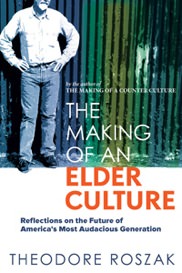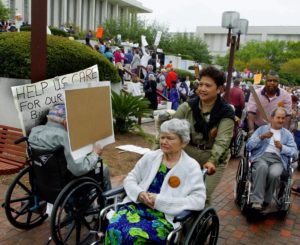Fred Branfman on ‘The Making of an Elder Culture’
In Theodore Roszak's spirited new manifesto, he calls on aging baby boomers to rekindle their youthful idealism and remake America.
Was it bitter then with our backs against the wall? Were we better men than we’d ever been before? Say, if she came again today, would you still answer to the call? Tell the truth, my friend, don’t it matter anymore?
— from “Living Legend,” by Kris Kristofferson
Could the demographics and economics of a giant aging baby-boom generation unleash long-repressed pools of youthful idealism to produce a new “elder culture”? Could boomer seniors finally realize the failed hopes of their youth for a socially just, environmentally sane, nonmaterialistic and peaceful America? And, whatever happens to society as a whole, can old age, health scares and greater proximity to death produce psychological and spiritual breakthroughs for individual boomers that vastly enrich and deepen their lives?
As I read Theodore Roszak’s lyrical passages in “The Making of an Elder Culture” about the possibilities of personal transformation through aging I remembered Hans, a fellow with AIDS with whom I used to meditate. The light, joy and spiritual energy he emanated made believable his claim that his illness had brought his life to new levels of joy. I was spellbound one morning, for example, as he described consciously taking several hours rather than his usual 20 minutes to walk to the Berkeley Co-op. He spoke vividly of the people, animals, homes, shops, trees, flowers, plant life; the shape and texture of the clouds; the thinking behind the use of space; the green areas; the way traffic was directed; how people treated their pets. I left our talk joyful myself, as often occurs for those interacting with someone who has had a taste of enlightenment.
Cases like Hans’ are far more common than we think, and it is in such possibilities for personal change that Roszak grounds his hopes for societal transformation. “If we confront the experience with full awareness, aging can prepare us to learn what so many great sages have tried to teach: to be mindful of our mortality, to honor the needs of the soul, to practice compassion. Conscious aging opens us to these truths; it is a mighty undoer of the ego,” he writes.
The Making of an Elder Culture: Reflections on the Future of America’s Most Audacious Generation
By Theodore Roszak
New Society Publishers, 320 pages
He teaches Tolstoy’s story “The Death of Ivan Ilyich,” he explains, because it illustrates how proximity to death can lead to a greater appreciation of life: “I have valued Tolstoy’s story over the years because it uses death so powerfully to teach the magnificence of life.” This theme is more fully developed in a new book, “Beyond Death Anxiety: Achieving Life-Affirming Death Awareness,” by Dr. Robert Firestone and Joyce Catlett, perhaps the clearest explanation to date of how unconscious death anxiety limits lives that can be vastly expanded if we dare to consciously feel our feelings about our mortality.
Although he believes aging can transform individuals, however, Roszak aims far higher, urging boomers to rekindle their youthful idealism and remake America: “I seek … above all, to create a new paradigm for aging that will enable the baby boom generation to live out its history with moral courage and high expectations.”
Roszak hopes that aging will see boomers combine a new “elder” consciousness with a real-life intergenerational political movement that will fight for entitlements not only for themselves but everyone in need. His new paradigm also includes “environmental enlightenment,” “voluntary simplicity,” “gentleness and ethical responsibility” and seniors engaging in “volunteer services, higher education, and political activism” on behalf of the young. He hopes that baby boomers, who in their youth created the civil rights, anti-war, environmental, sexual liberation and feminist movements, will as seniors once more mount the barricades and create the gentler, kinder American society of which they once dreamed.
And he is not coy about saying how this new paradigm will be financed. “And where will that money [for entitlements] be found except in the pockets of corporate America, where it has been stashed away in ever-increasing amounts since the days of the Reagan Presidency? When the crunch comes … we will hear the old populist battle cry: `Soak the rich!’ ” He would also, needless to say, dramatically reduce military spending.
For many, of course, Roszak’s dream is a nightmare. The “change” most Americans want from President Barack Obama is for him to restore their previous way of life, not transform it into an existence under a European-style welfare state. A Wall Street Journal editor recently opined that “old Europe lives in a world of unpayable public pension obligations, weak job creation for its younger workers, below-replacement birth rates … high taxes to pay for the public high-life, and history’s most crucial proof of decay — the inability to finance one’s armies.”
Others, while sharing Roszak’s hopes, will see them as being as naive as his overblown depiction of baby boomers in his best-selling 1969 book, “The Making of the Counter Culture.” Roszak himself writes now that “perhaps I would have [had] less hope of rapid social change if I could have foreseen how many members of the younger generation would eventually wind up as cultural conservatives or evangelical Christians [or] settle for lucrative business careers.” Also, of course, many formerly liberal boomers have grown politically disengaged over time.
And many “Y Generation” members will not seek to be led by boomer “elders” whom they see as at best well-intentioned but overweight, self-absorbed, impractical bloviators who smoked too much weed in their youth and fail to produce real-world results today. Many see both Bill Clinton and George W. Bush as archetypes of self-indulgent boomerism, and welcomed Obama not only for his personal qualities but as a symbol of generational change.Before too quickly dismissing what Ernest Callenbach terms Roszak’s “call to arms for the aging but increasingly assertive boomers who will transform America and the world,” however, it is worth taking the time to consider his argument. For his call comes with a new twist: the real-life demographics and economics that may now make many counterculture ideals not mere hopes but necessities for survival. Few may presently wish to see America scale down and pull back, and prioritize welfare over warfare, but they may find they have little choice if they wish to avoid calamities beyond our present imagining.
Roszak embeds his vision in one incontestable fact: As 77 million baby boomers turn 65 between 2011 and 2030 and live far longer than Americans ever have and birthrates continue to decline, seniors will constitute an unprecedentedly high portion of the population. What he calls the “longevity revolution” will see tens of millions of boomers live into their 80s, 90s or beyond. (The 2008 Social Security trustees’ report puts male life expectancy at 82, female at 84, for those who reach 65 in 2010.)
As they age, baby-boom seniors are likely to find themselves needing increasing health care and living assistance to survive — whether in family homes, cooperative senior housing arrangements or nursing homes.
The Making of an Elder Culture: Reflections on the Future of America’s Most Audacious Generation
By Theodore Roszak
New Society Publishers, 320 pages
Members of a shrinking younger generation facing increasing unemployment and decreasing incomes, however, will find it difficult to keep their parents and grandparents alive on their own. Increasing numbers, especially women, are already shifting from raising kids to caring for aging parents, often for far longer than their parents spent raising them. Conservatives will claim that it is the job of families, not government, to take care of their seniors. But many families will find it impossible to care for both their children and parents without societal help.
Even under today’s probably unrealistic economic growth rate projections, the problems are daunting.
Social Security, which had 100 workers per beneficiary at its inception, has today a 3-to-1 ratio, which will become 2-to-1 by 2030. Its trustees estimate that $4.3 trillion in revenues will be necessary to keep it solvent. Medicare is in even worse shape, as its trustees recently reported: “The projected exhaustion of the HI [Hospital Insurance] Trust Fund within the next eight years is an urgent concern.” Roszak also notes that many boomers failed to save and/or have suffered major losses in retirement income as a result of the collapse of the Internet and housing bubbles or cancellation of promised company pensions. They will be hard-pressed to afford $50,000 a year for living in a nursing homes or even to survive on their Social Security payments. While keeping the present Social Security and Medicare systems solvent is relatively simple, the combination of all likely future senior needs will place unprecedented pressure on the rest of society.
And this is true even in the unlikely event that America’s economy grows as expected, e.g. at the 2 percent “intermediate” annual GNP growth rate upon which Social Security trustees base their current projections.
The U.S. economy could stay stagnant or even shrink as current policy bails out but fails to reform America’s deeply corrupt financial institutions, which continue the practices that nearly destroyed the world economy in 2008; as it fails to develop a national economic strategy to ensure that U.S.-owned companies lead in the renewable energy and other cutting-edge industries of the future; as U.S. creditors reduce their lending and, as recently reported, seek alternatives to the dollar standard; and as the U.S. continues to spend money it can no longer afford on war and its worldwide military structure. The Obama administration’s borrowing may restore some short-term growth, but what will happen when these sky-high debts become due and America cannot repay them?
Whatever America’s future level of economic distress, it is clear that the nation will have to make hard choices it has never faced before. Medicare provides a clear example of what is involved. As Roszak notes, “true, billions of dollars flow into Medicare every year, but none of it is paid out to seniors. … The Medicare program should be seen as an income-transfer program that passes billions into the hands of the country’s richest class: physicians, health-care entrepreneurs, and drug and insurance companies and their investors.”
When Medicare growth is capped, and “waste and fraud” is addressed, the basic choice will be stark: maintain existing services to seniors by cutting health provider income, or maintain their income by cutting services and increasing the senior death rate. Similar choices will have to be made in many other sectors of our economy and society, affecting not only seniors but all those in need.Roszak’s hopes for meeting people’s needs through “voluntary simplicity” and legislated redistribution of wealth rest on three premises:
1. That boomers will fight for their benefits. “In the 1960s, unruliness was located among the young. But as mature boomers claim their entitlements, they will once again be in a position to grow unruly. We may be in sight of a surprising display of elder insurgency,” he writes.
2. That non-seniors, unwilling to let their parents have lives that are shorter than medical science permits, will support their entitlements. “Can we imagine some political leader taking the position that people are living too long?” Roszak says. He also hopes that younger people will realize that what they do for their parents today will be done for them tomorrow.
3. That boomers, rather than behaving as self-interested “greedy geezers,” will renew their youthful values and fight for rights for everyone. “I have been arguing that the senior dominance that lies ahead of us will shift values throughout the industrial societies in ways that will encourage populations as a whole to demand the same entitlements that the elders of society receive,” he says.
The Making of an Elder Culture: Reflections on the Future of America’s Most Audacious Generation
By Theodore Roszak
New Society Publishers, 320 pages
This point is key because it seems obvious that an economically strained workforce will have at best mixed feelings about supporting benefits for seniors no matter how much the workers love their parents or fear their own senior years. (He does not address the thorny question of how many overstretched adult children will, consciously or unconsciously, hope for their parents’ passing so as to gain an inheritance or home.) And conservatives have already begun to develop a “Youth Strategy,” similar to the right’s 1960s “Southern Strategy,” that could well limit seniors’ life-support systems.
Boomers may thus well need to build an intergenerational movement fighting for entitlements for everyone — universal single-payer health care, vastly extended unemployment insurance, income support for those who cannot survive on their own — to achieve both their outer needs and inner ideals.
For this to happen, Roszak argues, elders will need to develop a new consciousness. He quotes Gray Panthers founder Maggie Kuhn: “We must act as the elders of the tribe, looking out for the best interests of the future and preserving the precious compact between the generations.”
He unfortunately does not explore the irony of this call, given that much of their psychological energy in the ’60s derived from boomers feeling betrayed by their own elders — particularly by being drafted into an Indochina war that massively slaughtered innocents. The “generation gap” was a major hallmark of the ’60s, featuring rifts between leaders and students, parents and children, and even an “Old” and “New” Left. Can boomers without elder role models of their own now serve as wise elders to their kids and grandkids? It will be redemptive if they can, but the question is clearly still open.
In the end, Roszak’s hope that aging can transform the individual and his hope that it can transform society merge. Only as baby boomers renew the idealism of their youth, he argues, will they be able to create the materially poorer but spiritually richer America needed to keep seniors alive and younger generations intact.
It is far too early to say whether boomers could succeed even if they tried, however, because our current times have no historical parallel. America has faced economic hard times before, but never in a “late-capitalist” phase featuring huge and unpayable debts, an unaffordable war machine, a burgeoning senior population and biospheric crises which beggar the imagination.
Unprecedented problems produce unprecedented resolutions. It is as easy to imagine an Orwellian future in which the rich and powerful rely on police-state measures to protect their way of life as it is to picture one marked by democracy, decency and peace.
All we can really know now is that by the time the last boomer turns 65 in 2030 America will have changed profoundly in ways we cannot presently imagine.
And one more thing.
If a socially just and democratic America that has helped preserve the biosphere its young will need for life itself does emerge, it will be largely because baby boomers did rise to the challenges of their time and redeem the dreams of their youth.
Countercultural boomers may not ride again. But only if they do, allying with their young, are they likely to see an America that they will wish to pass on to those who will follow them.
|
Fred Branfman, the author of a number of books and the editor of “Voices From the Plain of Jars: Life Under an Air War,” exposed the U.S. secret air war in Laos while living there from 1967 to 1971 and went on to develop solar, educational and Information Age initiatives for California Gov. Jerry Brown and national policymakers. |
Independent journalism is under threat and overshadowed by heavily funded mainstream media.
You can help level the playing field. Become a member.
Your tax-deductible contribution keeps us digging beneath the headlines to give you thought-provoking, investigative reporting and analysis that unearths what's really happening- without compromise.
Give today to support our courageous, independent journalists.







You need to be a supporter to comment.
There are currently no responses to this article.
Be the first to respond.